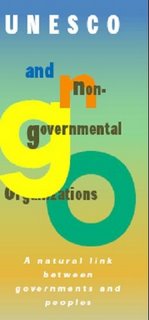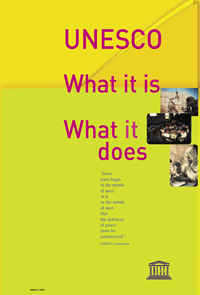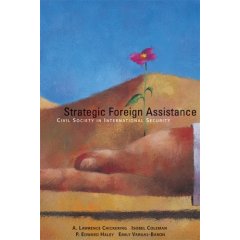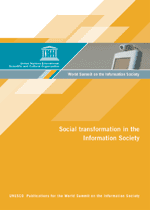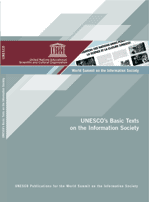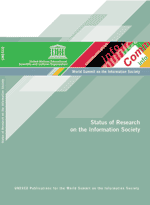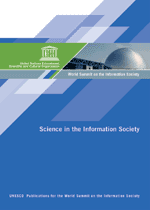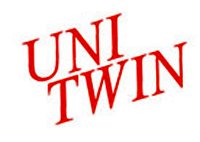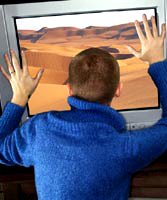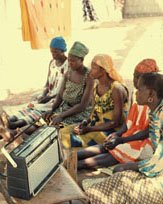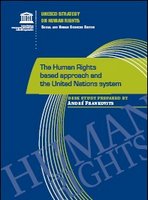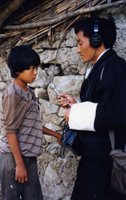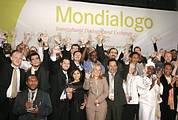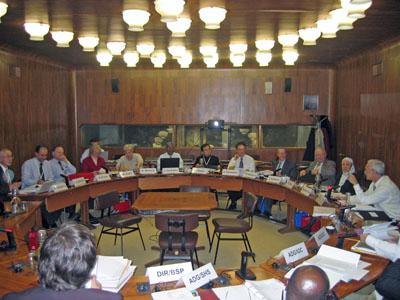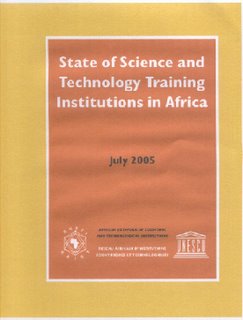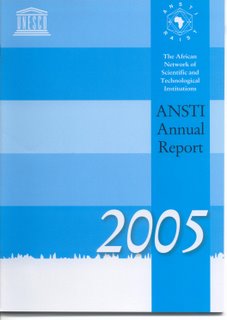Read the full, 172 page progress report on the first six months of UNESCO's 2006-7 biennium program from the Director General.Key sections of the report providing overall assessments of the science and communications programs are quoted in their entirety below:
Natural Sciences"Major Programme II (MP II) continued its focus on capacity-building and networking in science, including for science policy-makers and youth, through ongoing programmes and in particular through the IBSP and activities in support of NEPAD. Women received special attention in several capacity-building events in the basic sciences, and through the ongoing UNESCO-L’Oreal Prizes and scholarships, which were awarded in March 2006. In consideration of the importance attached to United Nations coordination in the areas of science and technology and the environment, representatives of the Natural Sciences Sector actively participated in United Nations-wide coordination mechanisms in these areas, including the United Nations Environmental Management Group, the Environment Consultation of the Secretary-General’s High-level Panel on United Nations System-Wide Coherence in the Areas of Development, Humanitarian Assistance and the Environment, and the United Nations Commission for Science and Technology for Development at which UNESCO invited the UNCSTD to hold its next meeting at UNESCO Headquarters. Further, UNESCO hosted a planning meeting with the Rector and staff of the United Nations University to discuss current and future cooperation in the sciences. Similarly, following an earlier planning meeting between the Sector and the International Council for Science (ICSU) Secretariat, the Director-General met with the President and Executive Board of ICSU to further discuss cooperation in fields of common concern, such as follow-up to the Millennium Ecosystem Assessment and disaster reduction.
"UNESCO played a key role in several major events that took place during the reporting period. The Nigerian Parliamentarian S&T Forum was launched by the Director-General in June 2006 as part of the efforts to strengthen the role of parliamentarians in policy-making in science, technology and innovation. The Future of Drylands (Tunis, June 2006), an assessment of work over the 50 years since UNESCO’s first conference on deserts, drylands and sustainable development, resulted in the adoption of a “Declaration on Research Priorities to Promote Sustainable Development in Drylands” (the Tunis Declaration) which identifies 12 priority themes for sustainable development in drylands. The Strategic Role of Renewable Energy for the Sustainable Development of Central Asia (Almaty, Kazakhstan, May 2006), was an important first step to expanding UNESCO’s renewable energy capacity-building activities in this region. Lastly, UNESCO actively participated in the Fourth World Water Forum (WWF-4) which was held in Mexico City in March 2006. The Second World Water Development Report (WWDR-2), which is the main output of the World Water Assessment Programme, was launched during the Forum on World Water Day.
"The IHP Bureau met to begin the process of elaborating the Programme’s seventh phase. The Bureau emphasized the importance of keeping IHP policy-relevant, particularly at a time when the water crisis is seen as a crisis of water governance. Based on the contributions received from Member States, the Bureau also noted that the topic of shared water resources and water conflict resolution should remain an important component of IHP plans. In addition, four new water-related centres were formalized through agreements with their host countries,and an additional one was approved by the Executive Board at its 174th session.
"Studies on different ecosystems (drylands, coastal and mountain ecosystems, urban systems, etc.), accompanied by capacity-building efforts through international scientific workshops and education schemes, made substantive progress, particularly via the Regional School on Integrated Management of Tropical Forests (ERAIFT). The IGCP (International Geoscience Programme) scientific board meeting in February 2006 reviewed IGCP’s objectives to increase its focus on geoscience and the water cycle, geohazard mitigation, earth resources, global change and the study of the deep Earth. The reorientation of the programme aims at better meeting the needs of society and sustainable development. Through UNESCO’s participation in the implementation of GEOSS (Global Earth Observation System of Systems),there was a marked increase in earth observation activities meant to improve the management of World Heritage sites, Biosphere Reserves and Geoparks.
"UNESCO/IOC officially launched The Tsunami Early Warning and Mitigation System for the Indian Ocean, successfully meeting its target delivery date of June 2006. The Indian Ocean System consists of a seismographic network, a real-time sea level network, and three deepocean assessment and reporting of tsunamis sensors. These are all firsts for the Indian Ocean. UNESCO/IOC is continuing its work to foster warning systems similar to that for the Indian Ocean in the Mediterranean, Northeast Atlantic and the Caribbean. IOC also hosted two significant meetings. First was the Conference of the Global Forum on Oceans, Coasts and Islands in January, which addressed governance of the high seas and the effects of climate change on oceans and coastlines. The second was the June World Climate Research Programme meeting, Understanding Sea-Level Rise and Variability, which sought to improve observational tools and reduce uncertainty.
"The basic sciences have focused on building additional new partnerships and fostering a networking strategy towards building scientific capacity in Member States within the framework of the IBSP and other programmes in the basic sciences. The second meeting of the IBSP scientific board specifically addressed these issues of new partnerships and networking. The Organization also actively contributed to the implementation of the Hyogo Framework for Action (2005-2015), in particular with the launch of the 2006-2007 world campaign on education for disaster reduction on 15 June 2006.
"UNESCO, as the lead agency of the United Nations S&T Cluster in support of NEPAD, is coordinating the 2007 special session of the African Union Summit to be devoted to science and technology. To this end, several consultative meetings were held which focused on drafting the implementation agenda for the African Science and Technology Consolidated Plan of Action, and raising donor support. Steady progress has also been made on the issue of sustainable development in SIDS, including the launch of the book Water and Indigenous Peoples at WWF-4. The UNESCO Science Report 2005, which reviews the state of science around the world through the eyes of an independent team of experts, was released during the semester and its findings received a large echo among scientists and science decision-makers, and in the media."
Social and Human SciencesDuring the first six months of the 2006-2007 biennium significant progress was made under Major Programme III to implement the relevant resolutions of the General Conference at its 33rd session and the approved 33 C/5: in the normative area, the Universal Declaration on Bioethics and Human Rights (2005) and the International Convention on Doping in Sport (2005) were widely disseminated in different forums and through various publications, with a view to ensuring their ratification and entry into force. In addition, the World Commission on the Ethics of Science and Technology (COMEST) considered a series of key ethical questions emanating from recent global, scientific and technological progress during its extraordinary session on 27 and 28 June 2006, and made significant recommendations to the Director-General on UNESCO’s future action in this regard. These recommendations will be shared with the Executive Board at its 175th session (see document 175 EX/14).
"UNESCO furthered its action in reinforcing the links between social science research and policy-making in the fields of human rights, the fight against discrimination, and human security by strengthening its networks on economic, social and cultural rights in the Arab States, Latin America and Africa; launching the Coalition of Cities against Racism in Latin America, Africa and the Asia-Pacific region; promoting human security at the regional level in South-East Asia and the Arab States; and building the capacities of Member States in the field of gender equality and development. Emphasis on the research-policy nexus was also furthered in the field of philosophy by mobilizing key partners through the worldwide survey on philosophy teaching, preparing for the forthcoming celebration of the World Philosophy Day to be held in Morocco in November 2006, and organizing various interregional philosophical dialogues. Cooperation has also been strengthened with other United Nations agencies, funds and research institutes in this area, which is essential for creating synergies and avoiding the duplication of efforts.
"To provide the space for decision-makers and social science researchers to come together to enhance the research-policy nexus in the human and social sciences, UNESCO also organized and participated in various forums. Examples include the first International Forum on Social Science-Policy Nexus in Argentina and Uruguay in February 2006; forums organized for Ministers of Social Development in Africa and Asia under the auspices of UNESCO; and UNESCO’s participation in the third session of the World Urban Forum held in Vancouver, Canada, in June 2006 and the second World Forum on Human Rights held in Nantes, France, in July 2006."
Communication and Information"The implementation of Major Programme V (Communication and Information) is geared towards attaining strategic objectives 10, 11 and 12 assigned to the programme in the Medium-Term Strategy for 2002-2007 (31 C/4), namely “promoting the free flow of ideas and universal access to information”, “promoting the expression of pluralism and cultural diversity in the media and world information networks” and “access for all to information and communication technologies, especially in the public domain”.
"Within the framework of the principal priority of Programme V.1 “Empowering people through access to information and knowledge with special emphasis on freedom of expression”, action was initiated along four main thrusts: (i) promoting freedom of expression and freedom of the press; (ii) creating an enabling environment which is conducive to and facilitates universal access to information and knowledge; (iii) developing effective “infostructures”; and (iv) stimulating the development of and access to diverse content.
"The celebration, on 3 May, of the World Press Freedom Day, and the outcomes of the international conference on 'Media, Development and Poverty Eradication' held on that day, in Colombo, Sri Lanka, reaffirmed the fundamental principles of freedom of expression and press freedom, while highlighting that press freedom is part of the agenda for a human rights-based approach to development and poverty eradication as elaborated in the United Nations Millennium Declaration and the Millennium Development Goals (MDGs). The role of media and information in harnessing knowledge for development was at the centre of the discussions of the fourth session of the Information for All Programme (IFAP) Council which met in March 2006 and confirmed its three strategic priorities – information literacy, information ethics and information preservation.
"The implementation of the outcomes of the World Summit on the Information Society (WSIS, Phases I, Geneva, and II, Tunis) was continued during the period under review. In accordance with the Tunis agenda for the Information Society and the Consultation Meeting on Possible Action Line Moderators/Facilitators (Geneva, 24 February 2006), UNESCO was designated provisional focal point for six WSIS Action Lines, of which three are under the direct responsibility of Communication and Information Sector (CI), namely 'Access to information and knowledge' (C3); 'Ethical dimension of the Information Society' (C10) and 'Media' (C7).
"Under Programme V.2, Promoting communication development and ICTs for education,
science and culture, actions were geared towards: (i) supporting the development of
communication media, including in conflict and post-conflict areas and post-disaster
situations; and (ii) enhancing learning opportunities through access to diversified contents and delivery systems – thereby contributing to achieving the EFA target goals and the WSIS Action Plan – , and strengthening capacities for scientific research and information-sharing.
"The International Programme for the Development of Communication (IPDC) is a main instrument of UNESCO’s efforts to support media development, including professional and institutional capacity-building. The external evaluation of IPDC carried out in early 2006, following the implementation of a three-year reform programme, commended the improvements in IPDC’s working methods and the innovative manner in which the programme implements and funds projects. IPDC could help in facilitating the implementation of the WSIS Action Line on Media by developing indicators for media development and providing a forum for global media development issues such as safety of journalists.
"Partnerships and alliances are indispensable for achieving a greater impact in the activities and need to be given greater priority, especially in resource mobilization. In this context, cooperation with the private sector led to achieving progress in fostering community access and diversity of content. Cooperation with Sonatel in Senegal had direct benefit for community multimedia centres (CMCs) across the country. Other such initiatives included the development of “ICT Competency Standards for Teachers” in cooperation with private sector partners Microsoft, Intel and Cisco.
"The CI Sector continued to spearhead joint intersectoral action in areas such as ICTs in education with Major Programme I; broadening access to scientific and technological information through media and ICTs; and the the use of ICTs to foster cultural and linguistic diversity in the media and in cyberspace. Intersectoral action was further reinforced through the cross-cutting projects pertaining to the contribution of information and communication technologies to the development of education, science and culture and the contributing of knowledge societies."
